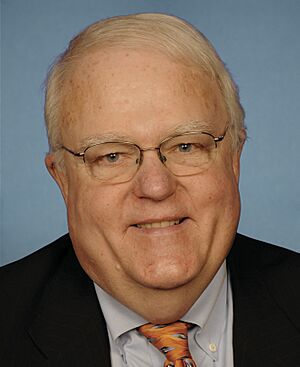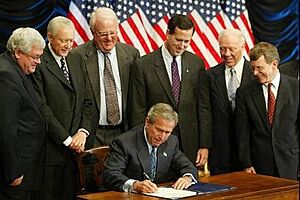Jim Sensenbrenner facts for kids
Quick facts for kids
Jim Sensenbrenner
|
|
|---|---|
 |
|
| Member of the U.S. House of Representatives from Wisconsin |
|
| In office January 3, 1979 – January 3, 2021 |
|
| Preceded by | Bob Kasten |
| Succeeded by | Scott Fitzgerald |
| Constituency | 9th district (1979–2003) 5th district (2003–2021) |
| Chair of the House Judiciary Committee | |
| In office January 3, 2001 – January 3, 2007 |
|
| Preceded by | Henry Hyde |
| Succeeded by | John Conyers |
| Chair of the House Science Committee | |
| In office January 3, 1997 – January 3, 2001 |
|
| Preceded by | Bob Walker |
| Succeeded by | Sherwood Boehlert |
| Member of the Wisconsin Senate from the 4th district |
|
| In office April 8, 1975 – January 3, 1979 |
|
| Preceded by | Bob Kasten |
| Succeeded by | Rod Johnston |
| Member of the Wisconsin State Assembly | |
| In office January 1, 1973 – April 2, 1975 |
|
| Preceded by | District established |
| Succeeded by | Rod Johnston |
| Constituency | 10th district |
| In office 1969 – January 1, 1973 |
|
| Preceded by | Nile Soik |
| Succeeded by | District abolished |
| Constituency | 25th Milwaukee County |
| Personal details | |
| Born |
Frank James Sensenbrenner Jr.
June 14, 1943 Chicago, Illinois, U.S. |
| Political party | Republican |
| Spouse |
Cheryl Warren
(m. 1977; died 2020) |
| Children | 2 |
| Relatives | John C. Pritzlaff (great-great-grandfather) James C. Kerwin (great-grandfather) F. Joseph Sensenbrenner Jr. (2nd cousin) |
| Education | Stanford University (BA) University of Wisconsin, Madison (JD) |
Frank James Sensenbrenner Jr. (born June 14, 1943) is an American politician who was a member of the United States House of Representatives for Wisconsin from 1979 to 2021. He is a member of the Republican Party.
During his long career, he was the chairman of two important House committees: the Science Committee and the Judiciary Committee. A committee is a group of lawmakers who focus on specific topics, like science or laws. When he retired, Sensenbrenner was the most experienced member of Congress from Wisconsin.
In September 2019, Sensenbrenner announced he would not run for re-election in 2020 and would retire from Congress.
Contents
Early Life and Education
Jim Sensenbrenner was born in Chicago, Illinois. His family has a connection to the famous company Kimberly-Clark, which makes products like Kotex and Kleenex. His great-grandfather was the company's second president.
Sensenbrenner grew up in Shorewood, Wisconsin. He went to Stanford University and graduated with a degree in political science in 1965. After that, he earned a law degree from the University of Wisconsin Law School in 1968. Before being elected himself, he worked as an assistant for other politicians.
Political Career
Wisconsin State Government
Sensenbrenner's political career began in 1968, the same year he finished law school. He was elected to the Wisconsin State Assembly, which is part of the state's government. He served there until 1975. Then, he was elected to the Wisconsin State Senate and served until 1979.
U.S. House of Representatives
In 1978, Sensenbrenner was elected to the U.S. House of Representatives in Washington, D.C. He represented the people of his district in Wisconsin for over 40 years. He was re-elected 20 times, often by a large number of votes. This showed that he was very popular in his district, which was known for supporting the Republican party.
Role in Impeachment Trials
In 1998, Sensenbrenner was a House manager for the impeachment trial of President Bill Clinton. A House manager acts like a prosecutor, presenting the case against the official on trial. He also served as a manager in the impeachment trials of three federal judges in 1989, 2009, and 2010.
Laws and Security

Sensenbrenner was a key figure in creating the USA PATRIOT Act. This law was passed quickly after the September 11, 2001 terrorist attacks. Its goal was to give law enforcement more tools to find and stop terrorists.
Later, Sensenbrenner expressed concern about how the government was using the Patriot Act. He said that collecting the phone records of millions of innocent Americans was "excessive and un-American." In 2013, he introduced the USA Freedom Act. This bill was designed to limit the government's power to collect information and protect people's privacy.
In 2005, he also wrote the REAL ID Act. This law set new security standards for state driver's licenses to make them harder to fake.
Views on Other Issues
- Immigration: In 2005, Sensenbrenner sponsored a bill that would have created new punishments for helping people immigrate to the U.S. illegally.
- Health Care: In 2019, he was one of only four Republicans who voted for a bill to protect health insurance for people with pre-existing medical conditions under the Affordable Care Act.
- Intellectual Property: He supported laws to protect creative work like movies, music, and books from being copied illegally. This is known as protecting intellectual property.
- Animal Rights: In 2006, Sensenbrenner blocked a bill that would have made animal fighting a serious crime. The bill had a lot of support in Congress.
- Foreign Relations: He was the only Republican who joined a trip to India in 2008 to meet the Dalai Lama, the spiritual leader of Tibet. Sensenbrenner has also received awards from the governments of Japan and the European Union for his work.
Personal Life
Sensenbrenner married Cheryl Warren in 1977. They had two sons, Frank and Bob. His wife, Cheryl, passed away in 2020. When he was not in Washington, D.C., Sensenbrenner lived in Menomonee Falls, Wisconsin.
He is a descendant of the family that helped build the Kimberly-Clark company, but he has not been directly involved with the company himself. He has invested his money in stocks.
In 2009, Sensenbrenner announced he had been diagnosed with prostate cancer. He said it was caught early, and he received treatment.
Electoral history
This section shows the results of the elections Jim Sensenbrenner participated in throughout his career.
Wisconsin Assembly (1968–1974)
| Year | Election | Date | Elected | Defeated | Total | Plurality | ||||||
|---|---|---|---|---|---|---|---|---|---|---|---|---|
| 1968 | General | November 5 | F. James Sensenbrenner | Republican | 15,150 | 70.33% | Richard J. Regan | Dem. | 6,390 | 29.67% | 21,540 | 8,760 |
| 1970 | General | November 3 | F. James Sensenbrenner (inc.) | Republican | 12,802 | 73.44% | Margaret Rounseville | Dem. | 4,631 | 26.56% | 17,433 | 8,171 |
| 1972 | General | November 7 | F. James Sensenbrenner | Republican | 17,483 | 71.88% | Barbara Ulichny | Dem. | 6,840 | 28.12% | 24,323 | 10,643 |
| 1974 | General | November 5 | F. James Sensenbrenner (inc.) | Republican | 12,579 | 72.19% | Charles J. Sykes | Dem. | 4,847 | 27.81% | 17,426 | 7,732 |
Wisconsin Senate (1975–1976)
| Year | Election | Date | Elected | Defeated | Total | Plurality | ||||||
|---|---|---|---|---|---|---|---|---|---|---|---|---|
| 1975 | Special | April 1 | F. James Sensenbrenner | Republican | 16,605 | 72.63% | Robert A. Jakubiak | Dem. | 6,258 | 27.37% | 22,863 | 10,347 |
| 1976 | General | November 2 | F. James Sensenbrenner (inc.) | Republican | 47,605 | 100.0% | 47,605 | 47,605 | ||||
U.S. House of Representatives (1978–2018)
| Year | Election | District | Elected | Defeated (Democratic) | Defeated (Other) | Total | Plurality | |||
|---|---|---|---|---|---|---|---|---|---|---|
| 1978 | General | 9th | F. James Sensenbrenner | 61.15% | Matthew J. Flynn | 38.85% | 193,593 | 43,179 | ||
| 1980 | General | 78.39% | Gary C. Benedict | 21.61% | 263,065 | 149,389 | ||||
| 1982 | General | 100.0% | (no opponent) | 111,503 | 111,503 | |||||
| 1984 | General | 73.36% | John Krause | 26.11% | 245,711 | 116,115 | ||||
| 1986 | General | 78.22% | Thomas G. Popp | 21.78% | 177,402 | 100,130 | ||||
| 1988 | General | 74.91% | Thomas J. Hickey | 25.09% | 247,096 | 123,090 | ||||
| 1990 | General | 100.0% | (no opponent) | 117,967 | 117,967 | |||||
| 1992 | General | 69.70% | Ingrid K. Buxton | 27.95% | 276,760 | 115,536 | ||||
| 1994 | General | 100.0% | (no opponent) | 141,617 | 141,617 | |||||
| 1996 | General | 74.50% | Floyd Brenholt | 25.50% | 265,650 | 130,170 | ||||
| 1998 | General | 91.43% | (no opponent) | Jeffrey M. Gonyo (Ind.) | 8.55% | 191,976 | 159,114 | |||
| 2000 | General | 74.04% | Mike Clawson | 25.88% | 323,455 | 155,778 | ||||
| 2002 | General | 5th | 86.13% | (no opponent) | Robert R. Raymond (Ind.) | 13.32% | 222,012 | 161,657 | ||
| 2004 | General | 66.57% | Bryan Kennedy | 31.77% | Tim Peterson (Lib.) | 1.61% | 407,291 | 141,769 | ||
| 2006 | General | 61.76% | Bryan Kennedy | 35.68% | 315,180 | 82,218 | ||||
| 2008 | General | 79.58% | (no opponent) | Robert R. Raymond (Ind.) | 20.15% | 345,899 | 205,556 | |||
| 2010 | General | 69.32% | Todd P. Kolosso | 27.36% | Robert R. Raymond (Ind.) | 3.26% | 331,258 | 139,008 | ||
| 2012 | General | 67.72% | Dave Heaster | 32.05% | 369,664 | 131,857 | ||||
| 2014 | General | 69.45% | Chris Rockwood | 30.40% | 332,826 | 129,970 | ||||
| 2016 | General | 69.45% | Khary Penebaker | 29.29% | John Arndt (Lib.) | 3.92% | 390,844 | 146,229 | ||
| 2018 | General | 61.93% | Tom Palzewicz | 37.99% | 364,288 | 87,234 | ||||
 | Mary Eliza Mahoney |
 | Susie King Taylor |
 | Ida Gray |
 | Eliza Ann Grier |


